Effective Treatment for Extremely Dry, Sensitive, and Compromised Skin Conditions: CBD to the rescue
CBD and Your Skin ~ Are you experiencing dull, dry, flaking … the frustrating symptoms of skin – sensitivity and redness – cracks in your hands, chapped lips, and itchiness…UGH! Uncomfortable and sometimes even embarrassing, the way the skin looks and feels often leads to bathroom drawers filled with half-empty bottles, pots, and jars of expensive trial and error in the never-ending search for a solution that actually works!
Although dry skin is genetically imposed for some, anyone can experience it, particularly when faced with a drop in mercury or a windy season. These disruptive symptoms are generally caused by a decrease in water and oil in your skin’s uppermost layer, the stratum corneum. Oil (lipids) play a significant role in preventing evaporation of water by “holding it in,” while water is what helps your skin feel soft and flexible. Your skin’s outer layer also holds a group of substances called Natural Moisturizing Factors (NMF), which comprises elements like amino acids, peptides, sugars, lactic acid, and urea.
So what exacerbates dry skin? We all know trekking through cold and windy mountains will probably do it, but here are other circumstances in which you might experience more dryness.

- Dry air (or, on the flip side, low humidity) causes a marked decrease in water content in your skin. Dry air can be; the weather, climate, or overuse of indoor heating.
- Harsh skincare ingredients like soap, alcohol, and fragrance can potentially irritate skin and zap essential moisture from the skin.
- Hard water, which contains a high concentration of minerals like magnesium, lead, and zinc, can leave a film on the skin that blocks moisture to the skin.
- Overzealous washing strips the skin of its natural moisture.
- Age is a natural part of life, and skin tends to get thinner and dry for us as we get older and wiser.
- Swimming often tends to dry out skin due to the chlorine in the pools.
- Skin conditions like Eczema and Psoriasis manifest as dry skin.
If you’re itchy and flaking, try your best to avoid these triggers. For both instant and long-term relief—and to reinstate soft, supple, and healthy skin—always commit to a hydrating skincare regimen to feed your skin from the outside.
Severe dry skin is more than just frustrating – it can be both painful and embarrassing. One of the drivers of the frustration is that there is no single cause you can peg an extremely dry skin condition to. Rather, it can manifest due to a variety of factors. However, with knowledge of the potential causes and triggers, you can treat and manage extremely dry skin with proper skin care, the right products, and maybe a few changes to your routine.
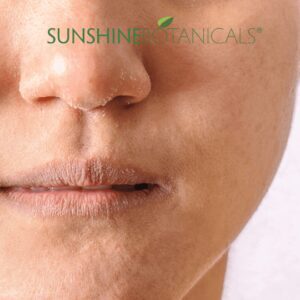
- Signs & Symptoms of Severe Dry Skin?
- What Causes Severe Dry Skin?
- Tips to Soothe Severely Dry Skin
- When to See a Dermatologist to Treat Extremely Dry Skin
- Key Takeaways
Signs & Symptoms of Severe Dry Skin
Skin is the body’s largest organ and can range from normal to severely dry, depending on many factors. Typically, extremely dry skin gradually progresses from normal to dry skin and then finally severely dry skin.
The skin has three layers. The top layer is the epidermis. The epidermis is where the skin tone is determined and forms a critical waterproof barrier between our internal organs and the external environment. When dry skin issues arise, the epidermis is where the problems reside. The dermis is beneath the epidermis. The dermis is where you will see tougher connective tissue, hair follicles, and sweat glands. The third deepest layer of skin is the hypodermis or subcutaneous tissue made of fat and connective tissue. These layers of the skin will look and function differently based on skin type.
Normal skin has a more substantial barrier that helps lock moisture in.
Normal skin describes well-balanced skin, meaning it isn’t too oily or dry. Generally, normal skin types have an even balance of sebum production, an oily and waxy matter that lubricates and waterproofs the skin’s surface.
Dry skin has a weaker barrier that allows moisture to evaporate, causing the skin to feel tight and rough-looking.
Dry skin occurs when skin cells produce less sebum (natural oils) than necessary. This lack of sebum results in the skin feeling tight with a dull or rough-looking texture. “That feeling of your skin being tight can happen all over your body. Wherever you have oil glands, and there is less sebum being produced than necessary, your skin will feel dry and tight,” says Dr. Debra Jaliman,board-certified NYC dermatologist and Assistant Professor of Dermatology at Icahn School of Medicine at Mount Sinai.
Severely dry skin has an extremely weak barrier. Therefore moisture escapes quickly, leaving the skin rough, cracked, and flaky.
Severe dry skin can feel rough, tight, or itchy. It can also be identified through flaking skin and can sometimes crack and bleed if not treated. In severely dry skin, there is very little if any sebum produced. “Ideally, your skin is at its best when there is balance with sebum production. There needs to be a balance with skin’s moisture,” says Dr. Jaliman.
Signs of Severe Dry Skin
- Roughness – Some rough skin can usually be characterized as eczema: it can be discolored scaly. Rough skin can even sometimes get caught on fabrics. “This can often look like a dry rash and can appear on any body part. Also, Keratosis pilaris can be red and have a sandpaper/rough-like texture, which can get caught on and sometimes scratch fabrics,” says Dr. Todd Besnoff of Ultimate Image Cosmetic Medical Center.
- Severe Itchiness – Avoid hot showers as they will make dry skin even drier and increase its itchiness. Thick, heavy products have more staying power and will keep water from evaporating from your skin. When the skin has lost a lot of moisture, it causes that itchiness, Once you rehydrate and moisturize, you will feel the itchiness start to lessen.
- Slight to Severe Flaking – Making sure your skin is always moisturized is very important. If your skin is starting to shed in large flakes, or you see flakes of skin on your black clothing, that is a reliable sign that your skin is severely dry and needs additional care. Flakey skin is definitely a symptom of very dry skin. We need to keep the skin hydrated. Drinking at least 7-8 glasses of water can help keep your body hydrated.
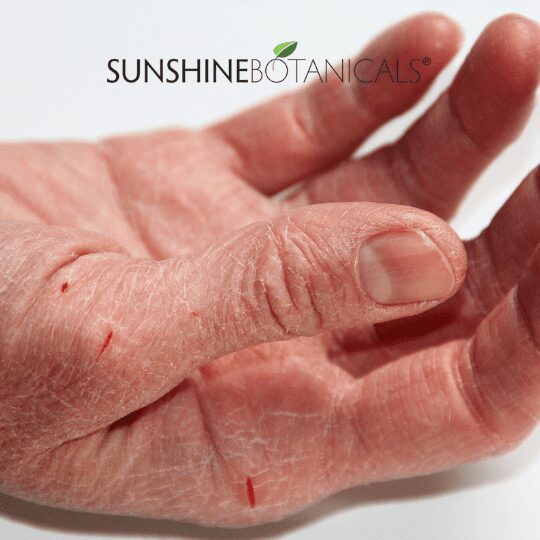
Tip: It’s essential to wash your skin well when we come from outside to remove any dirt or pollution from the surface skin to lessen severe flaking skin. Gently exfoliate your skin using a washcloth; you don’t want to scrub too hard but instead, rub lightly. Even the best skin in the world will look dull if it is never exfoliated.
6. Skin Fissures – When the skin becomes severely dry, the moisture barrier is compromised, and breaks in the skin can occur. These tiny cracks in the skin are Skin fissures. Left untreated, they can become much more significant cracks.
7. Cracked Skin – Skin loses its elasticity due to the lack of water in the skin, and with body movements such as stretching or moving, the skin can break. Cracking happens when skin loses its ability to hold moisture and the skin barrier is compromised. In particular, these cracks can become especially deep and, if not treated, can become infected.

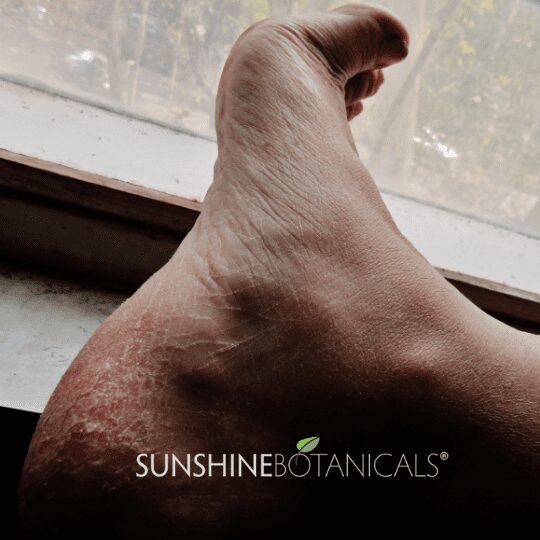


Areas Prone to Skin Cracking:
Knee ~ Elbow ~ Ankles ~ Knuckles ~ Nose ~ Heels of the feet ~ End of Finger or Thumb
Various Factors That Causes Severely Dry Skin?
The cause of severely dry skin is when no or very little sebum is naturally produced by the skin, leaving the skin lacking in moisture. Various factors can lead to a decrease in sebum production, from genetics to an increase in a hormone called dihydrotestosterone (DHT).
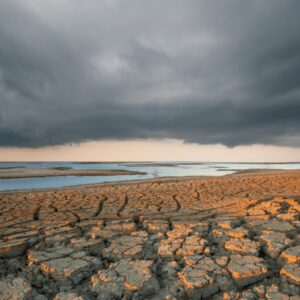
Weather can play a significant role in the condition of the skin; for example, extremely cold or desert climates have less humidity in the air. Climate changes can result in less natural environmental moisture for your skin, ultimately leading to skin drying out harshly and quickly. In these dry environments, lotions and moisture-rich creams are necessary to keep essential hydration from escaping into the environment. Moisture-rich creams will keep your skin supple and hydrated while keeping water from escaping.
The sun also plays a significant role in causing severely dry skin: Too much exposure to its UV rays causes the skin’s top layers to lose moisture and eventually turns into a sunburn. The most effective way to avoid sun damage is to apply sunblock 15 minutes before going outside or sun-protective apparel such as hats, long-sleeve shirts, and pants.
Skin un-protect from the sun UV rays can ultimately damage skin cells—this type of cell damage results on the body as skin dryness and uneven skin color or pigmentation.
Genetics
Every individual’s genetic makeup is unique, and these specific health markers determine the health of the skin barrier’s function. For example, atopic eczema is thought to be linked to a genetic mutation. The likelihood of childhood eczema is two to three times higher in children whose parents have it. Lipids are essential to the skin’s barrier function. With skin barrier function, changes in the Epidermal lipids are often caused by water loss, allowing cracks and openings to develop in the stratum corneum. Our Lipid Booster is vital as it creates a barrier that minimizes water loss and is essential for strong, healthy, hydrated skin.
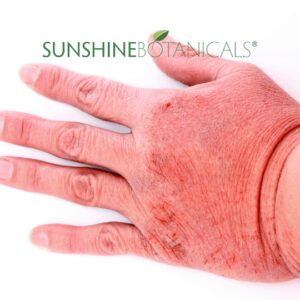
Eczema is a common skin condition that can affect people of all ages. Overall, it is when patches of skin become extremely dry, itchy, red, and irritated.
Psoriasis is a noncontagious long-lasting autoimmune condition that makes skin cells replicate faster than normal. Psoriasis appears on the skin in the form of red, raised skin with silvery scales. Although this can be genetically inherited, other factors can also increase flare-ups. High-stress levels, infections, and certain medications can also cause flare-ups. Other factors include sunburns, smoking, and excessive drinking of alcohol. Psoriasis often appears on the knees and elbows but can also appear on your face, scalp, neck, and feet.
Diabetes is an autoimmune disease that affects the body’s ability to produce insulin naturally. Insulin keeps your blood sugar level from getting too high—blood sugar changes in response to food, medications, illness, alcohol, etc. When dealing with diabetes, it is crucial to take care of skin, especially where dryness is more common, such as hands and feet, to ensure that it stays healthy and full of moisture. When your blood sugar gets too high, yellow, red, or brown patches can form on your skin. Blisters, shin spots, and itchy skin can also develop.
Medications
Some health-related medicines, such as specific cholesterol or acne, can cause skin redness, burning, excessively dry skin, and itching. So your severely dry skin may be a side effect of a newly started medication. Certain diuretics such as hydrochlorothiazide or furosemide, Retin-A, a topical medication prescribed for acne, can also cause severe dryness. If you’ve noticed any sudden change in your skin following a new medication, immediately consult your doctor\
Personal Care Products
Harsh soaps & detergents to clean your clothes can leave skin feeling irritated, scratchy, and dried out. If you are experiencing these symptoms, look for gentle, fragrance-free soaps and detergents to help alleviate the dryness and irritation. After taking warm showers with a mild cleanser, pat dry and use a deodorant specifically for dry and sensitive skin. Additionally, deodorants can aggravate sensitive underarms, while cleaning agents can leave skin feeling dry or hot.

Tips to Soothe Severely Dry Skin
As we’ve explained in our article about dry skin, the most effective way to treat dry skin is through a combination of ingredients. Similarly, treating extremely dry skin requires including nourishing ingredients plus a few modifications to your skincare routine. Here are a few of my tips
- Tip 1: Shower after swimming – Chlorine and other swimming pool chemicals can quickly dry your skin, leaving your skin feeling tight and uncomfortable. After spending time in the pool, hop in a warm shower for a quick rinse, use a gentle body cleanser, and pat skin dry.
- Tip 2: Moisturize after showering- The water causes skin cells to expand in the shower, providing an optimal hydration time. Before toweling off, starting with a wet skin moisturizer is a perfect option because it goes straight to work with our Red Algae Body Serum, as it will bind the water molecules to the outer layers of the skin.
- Tip 3: Use a humidifier – If you live in a low humidity area or harsh seasonal humidity, consider purchasing a humidifier to add moisture into the air and your skin.
- Tip 4: Take an oatmeal bath – If nothing else seems to be helping the dryness and itch of your skin, an oatmeal bath may be a lifesaver for your skin. “Simply blend some good ole’ oatmeal in a blender, sprinkle it in a warm bathtub, and soak for about 15-20 minutes,” says Dr. Besnoff. The blended oatmeal releases soothing beta-glucans into the bath to help soothe dry, itchy skin. “Oatmeal contains antioxidants that are great for treating most skin disorders.
Tip 5: Take supplements – Oils such as flaxseed and fish oil are high in essential fatty acids to help keep your skin healthy and glowing. Take them as a supplement or add them to your favorite meals. Flaxseed oil and fish oil promote skin health, decrease menopause symptoms, and aid in the growth of nails and hair.
- Tip 6: Protect your hands when cleaning – Your hands are also easily subjected to getting dried out by harsh chemicals. Make sure to wear gloves to help your hands avoid all of those chemicals.
 What can CBD do for your skin?
What can CBD do for your skin?
CBD is not just for pain and anxiety anymore. Cannabis and CBD extract have very positive effects on aging skin, especially when combined with synergistic herbs for targeted treatment for ultra-dry, sensitive skin needs. Studies have shown that the antioxidant and anti-inflammatory properties of full-spectrum CBD make this a very important ingredient in corrective skincare.
First, let’s talk about aging…two of the leading causes of skin aging are free radical damage and inflammation. While research into CBD is ongoing, what we do know so far seems to back this up. Here’s how the antioxidant and anti-inflammatory benefits of CBD affect the body’s largest organ:
- Regulates oil production. The overproduction of sebum is thought to be a contributing factor to acne. According to a 2014 study trusted Source, CBD may have an anti-inflammatory effect on sebocytes, the skin cells that produce sebum.
- Helps reduce inflammation. As an anti-inflammatory, CBD may be able to help reduce swelling, pain, and redness from irritation from skin conditions like eczema and psoriasis.
- Hydrates dry skin. Research from 2009Trusted Source suggests that CBD may be effective for dry, dehydrated skin.
What Can Science Finally, The Science behind Skin Care and CBD
I saved the best for last, Cannabinoid receptors discovered in keratinocytes, skin cells, and other aspects of the skin, such as the sebaceous glands, hair follicles, tiny nerves, and immune cells. CBD interacts with them as part of the skin’s endocannabinoid system. One study in 2007 identified that cannabinoids inhibit the overproduction of skin cells that could play a role in helping skin health. Naturally, there are many cannabinoid receptors in the different layers and parts of the skin, which the CBD interacts. An application can help with immune regulation, epidermal growth, sebaceous glands and secretion, and irritation.
In 2014, the research found that CBD behaves as a highly effective sebostatic agent. In other words, it has a positive effect on humans because it lubricates and waterproofs the skin.
What are the Biggest Health Benefits of CBD?
The most important aspect to note is that CBD works differently based on our own body’s natural reaction.” When appropriately used, CBD may have significant health benefits. CBD is an anti-inflammatory agent, and inflammation can be responsible for aging the skin. Incorporating it into your skincare routine can be very beneficial.
Anti-aging benefits aren’t the only boost CBD gives your skin. Recent studies found that topically applying a high-quality CBD can improve symptoms of acne, eczema, psoriasis, dermatitis, wounds, itching, and other rarer skin problems. I’ve seen particular efficacy for treating dry skin and fine lines, making CBD an excellent ingredient for all skin types.
I hope this information helps you find your solution, and I can’t wait to show you more! Follow us on FB and sign up for our newsletter.
My passion Is Your Solution,
![]()
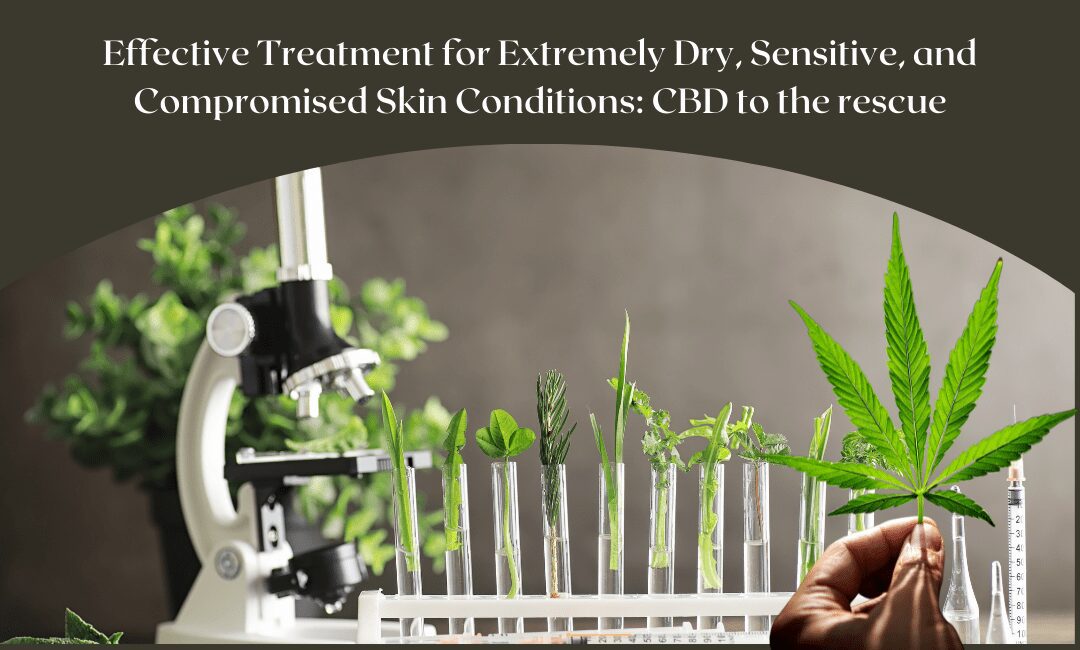
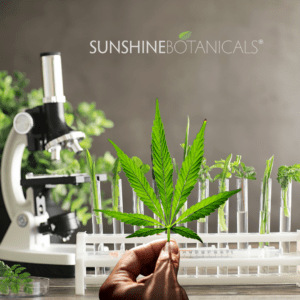
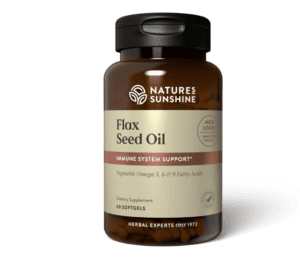
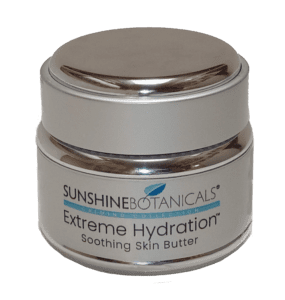 What can CBD do for your skin?
What can CBD do for your skin?